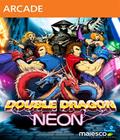For the 25th anniversary of the Double Dragon series, publisher Majesco and developer Wayforward Technologies teamed up with original series director Yoshihisa Kishimoto to bring the world not a sequel, not a reboot, but a reimagining of sorts. Among series fans, reactions to promotional material ranged from cautious optimism to outright revulsion, because, well, look at it. Listen to it. Fortunately, appearances can be deceiving, and a little polish can go a long way. Much like this spring's Kid Icarus: Uprising, Double Dragon Neon emerges as one of 2012's most satisfying and humorous action games, with "surprise sleeper" written all over it.
If you played the original few Double Dragon games in the arcades or on the consoles of the day, then the way Neon starts out will be nostalgically old hat. Marian gets punched in front of a garage and carted off one random day. Seconds later, the Lee Brothers, Billy and Jimmy — who've taken more than a few pages out of the Wyld Stallyns' vocabulary book since the last time we saw them — lament their kidnapped main squeeze and set off to rescue her, punching and kicking everything in their path.
The first two stages look and play as they did in the old days, save for upgraded visuals and an ear-massaging soundtrack (both of which we'll touch on soon). However, once those two stages are over, the game — for lack of a better term as well as a desire to avoid spoilers — goes to Crazytown in the absolute best way possible and ramps up from there, climaxing in a final act and ending sequence that rivals the Portal games in its self-aware hilarity. It's that good. And there's still reason to keep playing afterward.
The absolute first thing players will notice is the glorious soundtrack. One-third remixes of iconic tunes from the first couple of Double Dragon games, one-third arcade-style background music, and one-third original lyrical songs, the soundtrack is expansive and bursting with love and care evident from first game boot. Those of you with fond memories of Contra 4's remix treatment will find the same style prevalent for Neon's remixes, as they're done by the same composer (one Jake "virt" Kaufman), except this time, there's no underpowered Nintendo DS sound chip to deal with. As for the latter, the care taken in reproducing the style of popular '80s music shines, with the same hard, booming instruments and the same lovably cheesy lyrics. It works so well that it manages to evoke memories of my playing the first two Double Dragon arcade cabinets when they were still contemporary.
Bringing up the rear to the soundtrack is the voice acting, which is also purposely '80s and cheesy — almost to a fault but never quite crossing the line. There are a lot of bad jokes and outdated slang that will cause groans among the playing audience, and you can tell that the game gleefully revels in all of it. However, there are even more good jokes and homages to everything sprinkled throughout, from classics like He-Man, Mega Man and The Rocketeer to more current memes made famous by things like Team Fortress 2 and the Angry Video Game Nerd. It's fun to be a giant dork and point out all the homages, but if you can't, it doesn't hinder the game's fun in the slightest.
Double Dragon Neon looks almost as good as it sounds. It's another one of those games that uses well-animated polygons instead of sprites for a side-scrolling, beat-'em-up experience, and the artwork is full of color and life. Vibrant effects litter the screen, from explosions to colorful enemy teleport animations, from to the fire erupting from enemy jetpacks to the glow surrounding Billy and Jimmy as they air-guitar in triumph upon finishing a stage. It's a joy to witness.
Yet despite the spectacular presentation, the best part of this game is how it plays. It just works, enjoyably and effortlessly. The game speed is nowhere near as fast as the action games of today, as it's barely faster than the first two Double Dragon games. This extends to attack speed and startup and recovery times for defensive manevers, such as ducking, rolling and running. The smooth animations rarely get in the way of the snappy, responsive combat, though some people may have to get used to the timing for the defensive maneuvers to maximize their effectiveness. However, the lack of speed feels deliberate, and there is definitely a seamless flow between moves once you let the internal caffeine wear off and adjust to the game's pace. The move set is only slightly deeper than one would expect for a beat-'em-up, but through curiosity and experimentation, it's possible to create insane and hilarious combos using melee attacks, the environment, weaponry and Neon's very liberal juggle physics.
Extra depth is provided by the Mixtape system, which is divided into two sets of songs: one for personal augmentation and the other for powerful super techniques that can incapacitate enemies or send them flying. These songs can be shuffled, mixed and matched to form combinations that best fit personal play style and the combat situation. They can also be leveled up for extra effectiveness if you're really having trouble. Finally, there's the Gleam, which is activated by ducking at the exact moment to avoid getting hit. This allows players to deal double damage for a short time.
Abuse of all of these systems — combo creation, defensive maneuvers, Mixtapes and Gleam — are required to get through the higher difficulties. It's here where Neon shows its true charm as any video game should by encouraging smart usage of provided tools to accomplish a seemingly insurmountable task. Throw in some secret areas and bonus goodies, and Neon has some legs for those who wish to see it through the long haul. Best of all, its innovations and fun features do not not come at the expense of its chosen genre. Double Dragon, at its best, has always been about side-scrolling brawling with some mild platforming, and that's exactly what you get here. Even Bayonetta committed the sin of inserting a driving stage, but no such missteps are taken in Neon.
Unfortunately, not all is tubular sunshine and radical roses in Neon-land. There are some flaws which, due to the game being so fun in the first place, are thrown into starker relief than usual. In another game, they'd be forgiven; here, they actually serve to drag it down. The absolute silliest of these is the lack of online play. For all the fuss the game makes about playing this game co-op — and rightly so, this game was made for it, it almost feels like a waste not to share in the humor, and the juggle system works perfectly across two-player combo attacks — there's no way to play this outside of locally. While I appreciate the emphasis on local play since too many companies have been taking the reverse approach of online-only play, the beat-'em-up genre has grown increasingly more niche over the years, and sometimes you just need the Internet to find someone who's still a fan.
The Mixtape system, for all it lends to the game, feels a lot like Wayforward had a great mechanic on its hands but ran out of ideas after a certain point. The super moves especially suffer; there are a couple (such as the Spin Kick) that seem to be good in pretty much every situation while others are only fun experiments. A little bit more balance on this side would have been appreciated, but the ability to freely equip, shuffle and combine songs at any time in the game alleviates this concern somewhat through virtue of versatility.
The last flaw is likely something that just couldn't have been helped, but it is sadly realized once reaching the penultimate (and least interesting) stage of the game. It can leave players wanting more assets, more enemies, maybe a mission mode — more everything, really. Once this game throws all of its surprises at you (admittedly, it's got a lot of them), it just sort of ... stops doing so about the time you reach the graveyard stage. You see the recycling of enemy types who've just been reskinned, the game runs out of novel ways to play it, and somewhere along the line, the game reverts to being your standard '80s-homaging, forward-moving, button-mashing beat-'em-up despite trying to hard for so long to be something more. The genius of the final act more than manages to make a last-ditch save, but it still makes you wonder what might have been if this game had another year of extra development time. With more time spent on realizing the potential of an idea like Neon, this title could have been a disc-worthy bulletproof classic, doing for 2-D belt-scrolling action games what Devil May Cry did for 3-D stylish action or even The Dishwasher: Vampire Smile does for flat 2-D stylish action. As it stands, it has to settle for being a really, really good digital release.
Double Dragon Neon is a game that fully understands the job it came to do and fulfills it admirably. It holds up to the classic games, even surpassing them in some respects, while being tons of fun to both play and watch. While it leaves you wanting more, it does so in a relatively good way. While Neon has a few obvious flaws that arguably should never have happened in the first place, the overall product still knocks it out of the park while bursting with pride in everything that it is.
It therefore deserves the most fitting score I can think of.
Score: 8.7/10
More articles about Double Dragon: Neon











 Double Dragon: Neon is a face-melting '80s tour de force. Featuring bodacious characters, gnarly combat, and a retro aesthetic, it's pure over-the-top baditude ... to the max!
Double Dragon: Neon is a face-melting '80s tour de force. Featuring bodacious characters, gnarly combat, and a retro aesthetic, it's pure over-the-top baditude ... to the max!








